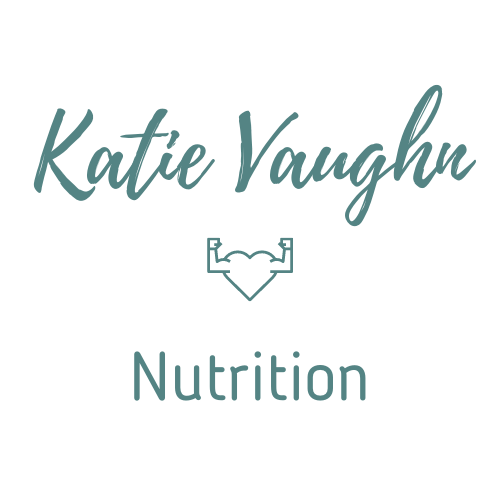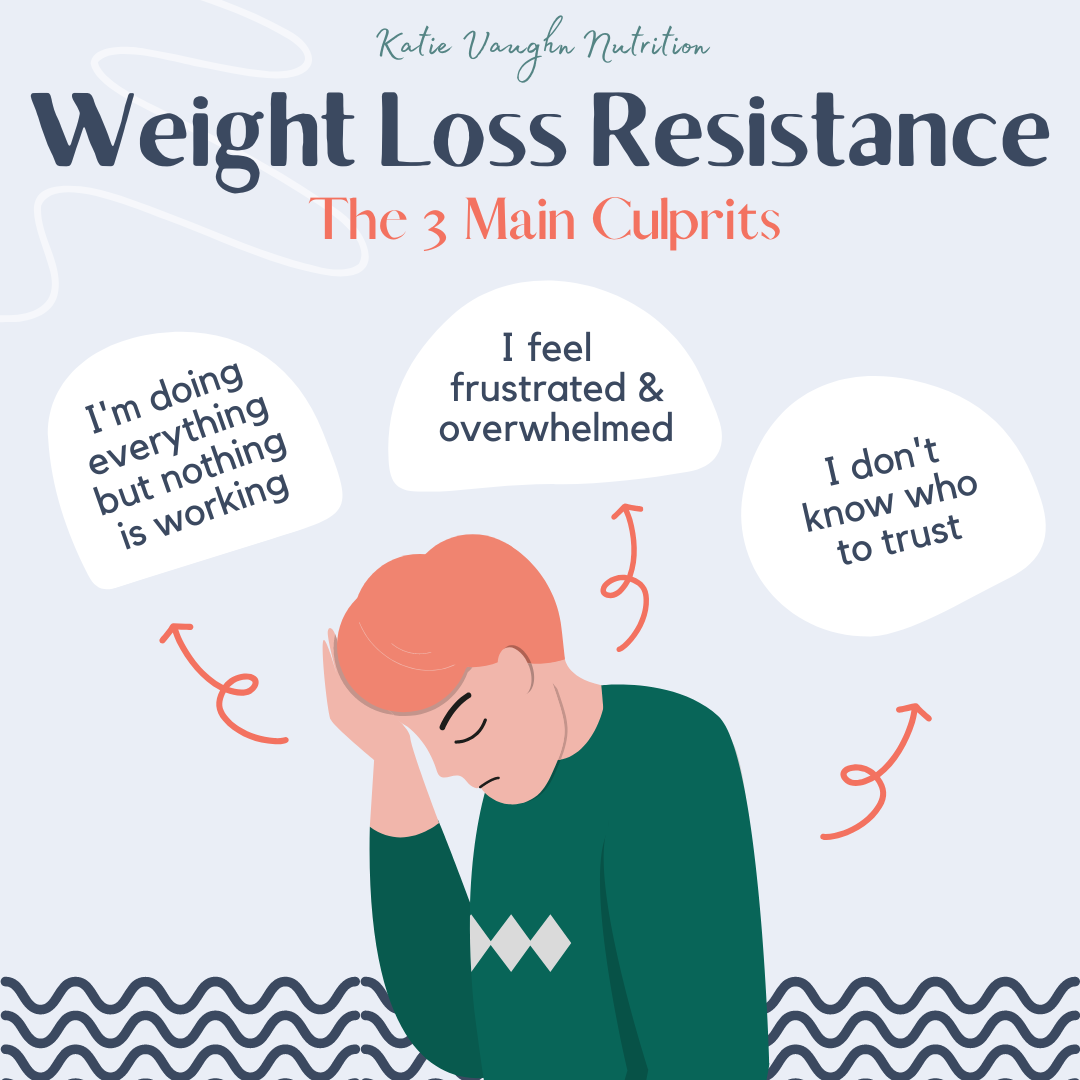Weight Loss Resistance - The 3 Main Culprits
January 31st, 2023
Weight loss resistance could mean doing all the things— counting calories, cutting out sugar and processed foods, exercising regularly— yet the scale is not budging. And this isn’t a week or two of the scale not budging (which would most likely indicate a plateau), this is months of no body composition change.
Not to mention, trying to read and listen and follow everything weight loss, ultimately leaves one frozen, overwhelmed, unable to trust and downright frustrated.
I feel this topic is of utmost importance for everyone, especially for those who are on a journey to achieve optimal health. And unfortunately, these main culprits are far more present than ever before.
First, let’s talk about what weight loss resistance is. Weight loss resistance is when someone has metabolic imbalances that make losing weight very difficult. Unless these metabolic and physiological imbalances are addressed, there is no amount of exercise, counting calories, crash dieting or supplement use that will help you lose body fat.
Here are the three main culprits of weight loss resistance:
#1. Stress. Poor stress management leads to an increase in our stress hormone, cortisol. Cortisol is responsible for regulating how much sugar (glucose) and fat gets stored in your body, and how much is released to use for fuel. It’s also your body’s main stress hormone. Your body makes and uses cortisol every day, throughout the day and night.
When you’re stressed, your adrenal glands release a burst of cortisol to help you cope, temporarily increasing your blood sugar for a boost of energy. When cortisol is chronically elevated due to poor stress management, it can decrease the effects of lipolysis, or burning fat. Not to mention, high cortisol levels mask fat loss. This is due to your body retaining more water from the inflammatory response that chronic high cortisol can cause.
In addition, cortisol also:
Controls blood sugar levels in the body
Regulates metabolism
Serves as an anti-inflammatory
Contributes to memory formation
Regulates the body’s salt and water balance
Affects blood pressure
Cortisol affects nearly every organ system in the body, such as:
Nervous system
Immune system
Cardiovascular system
Respiratory system
Reproductive system
Musculoskeletal system
Integumentary system (skin)
When working with a client, I take a deep dive into specific biomarkers to include cortisol, cortisone (cortisol precursor and important for maintaining healthy cortisol levels) norepinephrine/epinephrine, dopamine, and melatonin. This allows me to establish a sense of one’s overall stress response and to create specific interventions to help improve this response.
What to do:
1.) Adopt better stress management techniques. Here are some tips and strategies that can help with moderating your stress response.
2.) Blood sugar balancing nutrition plan
3.) Biomarker testing
#2. Insulin Resistance. 85% of the population is insulin resistant. That makes only 15% of the population metabolically healthy.
What is insulin?
Insulin is a hormone that acts like a key to let blood sugar into the cells to be used for energy. When you consume food it is broken down into blood sugar in the bloodstream. When this happens, the pancreas is signaled to release insulin to help the blood sugar enter the cells. It is then used for energy or stored in the liver to be used as energy later on. Once blood sugar enter the cells, insulin levels naturally lower.
This is when things are running smoothly.
When a lot of blood sugar enters the bloodstream, the pancreas pumps out more insulin to get blood sugar into the cells. Sugar then has a harder time getting into the cells, making them more and more resistant to insulin’s effect . The pancreas needs to make more insulin to get the job done. Eventually, the pancreas can’t keep up, and blood sugar will keep rising.
High amounts of blood sugar in the bloodstream is very damaging to the body and needs to be moved into cells as soon as possible. High insulin levels tells the liver and muscles to store blood sugar. When they’re full, the liver sends the excess blood sugar to fat cells to be stored as body fat causing weight gain. And what’s more serious, this sets the stage for prediabetes and type 2 diabetes. This is a state of being metabolically unhealthy.
Insulin is primary hormone responsible for body set weight. When levels of insulin are going up, it sends signals to your brain to gain weight. The result of this then affects hunger and satiety hormones that leads to over consuming foods since your hunger hormone (ghrelin) is increased and your satiety hormone (leptin) is decreased and also becomes resistant. Thus causing a larger appetite and cravings, overindulgence, and the inability to sense fullness.
Yes, your satiety hormone becomes resistant while increasing your hunger hormone!
Another biomarker that is more important than the typical fasting blood glucose is fasting blood insulin. Along with fasting blood glucose and HgbA1c (average blood sugar over 3 months), fasting blood insulin are biomarkers that I test for with each and every client. Unfortunately, many physicians are not always up on testing this marker, even though it’s a very cheap test, and will often deny this test. GET THIS: insulin will start to dysregulate way before glucose does.
The blood insulin biomarker can predict insulin resistance, pre-diabetes and diabetes decades before fasting blood glucose. CRAZY!
The fasting blood insulin biomarker has a standard range of 3-25 uU/mL on your typical blood test. Higher risk of metabolic syndrome is over a level of 7 uU/mL. A range between 2-6 uU/mL is best.
Do you see an issue with this test? Some physicians will see the number within the range (even if it’s 20), and automatically conclude that the client is “within normal limits” and is fine. When in reality, above a level is 7 uU/mL shows there is an issue with higher levels of insulin in the blood and body which either determines or can lead to insulin resistance.
Complications of blood sugar irregulation and insulin resistance if not addressed:
weight gain and obesity
inflammation in walls of vessels due to high blood sugars which can lead to:
diabetes
heart disease
osteoarthritis
Type III Diabetes, or Alzheimer’s (central insulin resistance in brain, brain cells are sensitive to insulin)
What to do:
Blood sugar balance. When working with clients, the main thing we address is blood sugar balance through food, exercise and other lifestyle behaviors. This should be the foundation and main focus (over calorie counting). Focusing on balancing overall blood sugar and insulin response is key to losing weight and improving body composition. For myself, I personally never count calories. I focus on whole, nutritious foods that support blood sugar optimization that naturally promotes steady energy and mood, well managed hunger levels and cravings, and improved body composition.
Note: We are not robots or calculators. It’s not as easy as calories in-calories out—an outdated model that doesn’t take into account the many different variables that affect weight loss.
Physical activity:
a. Strength training pulls more glucose into the cells and lowers insulin levels
b. Walking can help with blood sugar balance, especially post meal
Stress management
#3. Inflammation. When there’s inflammation on board, there is water retention— feeling puffy, bloated, and uncomfortable…yuck.
Excess toxins rev up stress hormones and inflammation, creating or exacerbating weight loss resistance.
Insulin resistance and toxicity often feed off each other, contributing to weight loss resistance. “Although increased sugar consumption, obesity, and lack of exercise certainly contribute, the effect of environmental toxins may be far greater,” says Joseph Pizzorno, ND. “The data are so compelling that some researchers now label these toxins as diabetogens.” Listen to a quick podcast with Dr. Joseph Pizzorno on this topic.
Today, over 80,000 chemicals have been registered to use in America, and every year about 2,000 new ones appear in things like foods, personal care products, prescription drugs, household cleaners, and lawn care products.
Toxic overload means your liver struggles to excrete excess hormones, creating hormonal imbalances as a result. Your gut also suffers.
Environmental toxins (along with chronic stress and an unhealthy diet) can also create dysbiosis or gut imbalances, which eventually develop into problems like leaky gut. Those problems put your immune system in overdrive and increase inflammation, again creating a vicious cycle that feeds weight loss resistance.
Most common toxic sources:
Antibiotics
Heavy metals
Phthalates
Pesticides
Artificial sweeteners and emulsifiers
Addressing gut health, virus, mold, histamines and any other environmental toxins or irritable foods can help reduce inflammation.
When I work with a client, I first start by getting to the bottom of the underlying issue as to what is making the client inflamed and retaining water.
A few tips to eliminate environmental toxins:
Let fresh air flow. Even in the colder months, open windows to allow fresh air to move through the house.
Use the least toxic household cleaners you can. Keep in mind that hot soapy water or diluted vinegar can take care of most cleaning tasks. When using ammonia or bleach remember to wear gloves, a mask and open the windows.
Use non-toxic personal hygiene products, cosmetics and sunscreens. This means avoiding chemicals like triclosan, parabens, phthalates, bisphenols, and sunscreen chemicals like oxybenzone and octinoxate—all of which are easily absorbed through the skin (your biggest organ).
Limit the use of plastics and nonstick cookware. Use glass containers for food storage.
Consume foods that support the gut:
Fiber-rich plant foods
Variety of plant foods to feed the different bacteria strains in the gut
Fermented foods such as yogurt, kimchi, kefir, miso and cultured cottage cheese, (Good Culture is my favorite brand)
Fish and foods high in Omega-3’s
Cut back on processed foods and added sugars
And that’s not all! There are other factors that can affect weight loss. Things such as:
poor sleep quality – leads to higher levels of insulin and poor blood sugar balance (more to come on this topic)
female and male sex hormone imbalances – things such as menopause, low testosterone, PCOS, & estrogen dominance
gut dysbiosis – an imbalance in the gut that affects millions of people.
I’ve worked with hundreds of clients who felt “stuck”. Feeling stuck is overwhelming and frustrating. Start now to take a deep dive into your health and wellness to become the best version of yourself— fit, strong, energized, and focused!
To learn more about how you can tackle your weight loss resistance, check out my customized nutrition programs.


